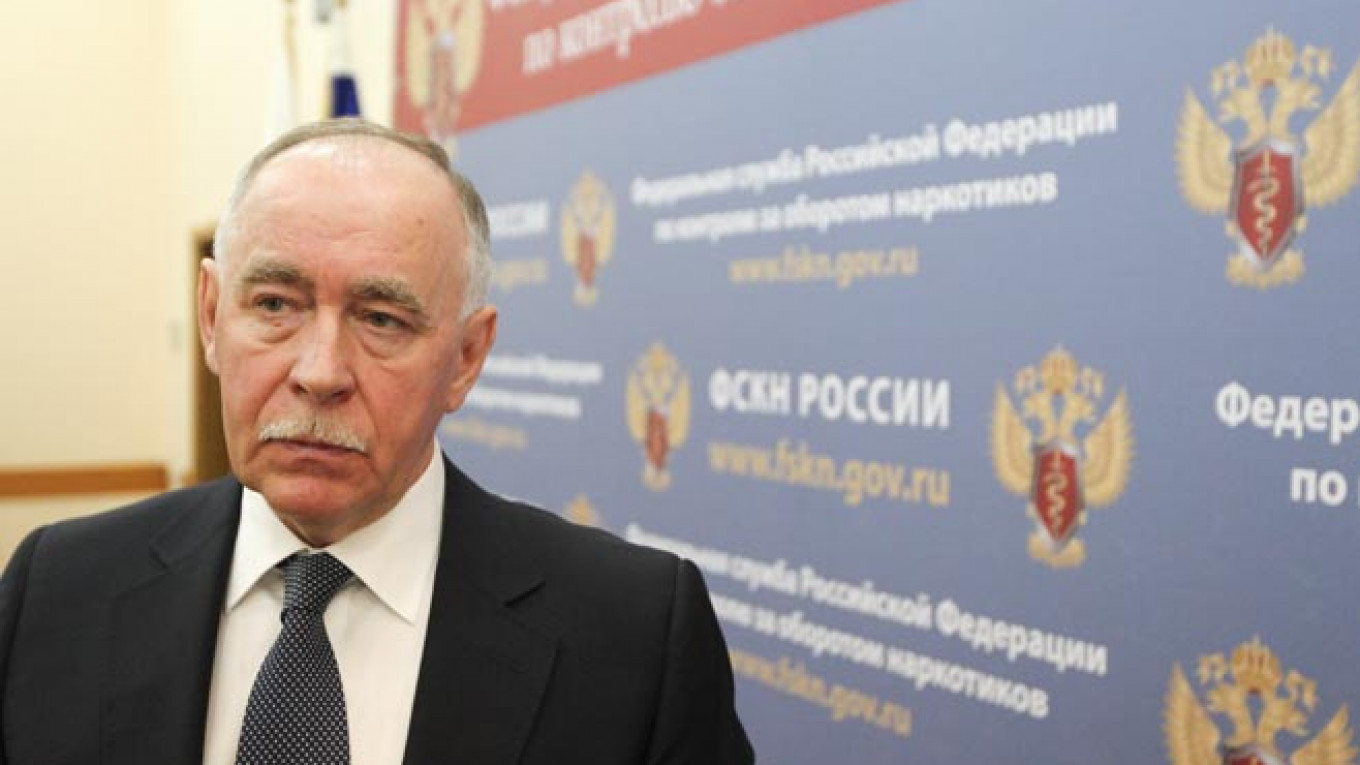U.S.-Russian cooperation in policing the international drug trade is suffering as sanctions over Russia's annexation of Crimea stretch taut relations to the breaking point.
Collaboration in the fight against the drug trade has been halted, a representative of the U.S. Office of National Drug Control Policy, or ONDCP, said Wednesday, Itar-Tass reported.
"In view of Russia's continuing violation of the sovereignty and territorial integrity of Ukraine, we are halting certain bilateral discussions with the Russian Federation, including [cooperation in anti-drug enforcement]," said Rafael Lemaitre, communications director of the ONDCP.
The Federal Drug Control Service said last week that Washington had "severed" cooperation in the battle against drugs after its director, Viktor Ivanov, appeared on an expanded list of Russian officials facing U.S. sanctions.
"One can only admire the breathtaking creativity of the officials in Washington," the Russian drug control agency said in a statement, scoffing at the decision to freeze Ivanov's assets and properties abroad when such holdings "naturally do not exist."
Ivanov later suggested that cooperation could continue as before. "We do not intend to wind down collaboration. Our colleagues from the ONDCP share this approach. I hope that these are the difficulties of a transitional period," Ivanov said at a session of the drug control agency's public council.
Ivanov added that Michael Botticelli, deputy director of the ONDCP, had been invited for a meeting in Moscow in May — a meeting that Botticelli has since declined to attend, Itar-Tass reported.
The episode raises concerns as to the potential impact of any further sanctions leveled against prominent Russian politicians involved in assimilating Crimea into the Russian Federation.
Potential targets could include such key figures as Prosecutor General Yury Chaika, who signed an order Tuesday establishing a Prosecutor General's Office in the Crimean capital of Sevastopol.
While tensions mount, other branches of government have indicated that they plan on continuing with business as usual.
Finance Minister Anton Siluanov on Wednesday said "everything will be alright" with the planned signing of an agreement on the Foreign Account Tax Compliance Act, a U.S. initiative to curb tax evasion by Americans employing offshore accounts, PRIME reported.
The measures, set to come into force on July 1, would require banks in Russia to report on any? transactions made or accounts held by U.S taxpayers to the U.S. Internal Revenue Service.
The Russian and U.S. law enforcement agencies have enjoyed a strong working relationship in recent years, both in the prosecution of particular cases and in joint training programs to build expertise in combatting human-trafficking, money laundering and corruption.
The two governments are obliged under a mutual legal assistance treaty ratified in 1999 to provide "comprehensive mutual legal assistance in criminal matters." The legislation extends across myriad forms of legal cooperation with the notorious exception of extradition, at times a thorny issue.
Thomas Firestone, who served as resident legal advisor at the U.S. Embassy in Moscow from 2002 to 2004 and again from 2006 to 2012, saw these working relationships persist even in previous instances of political strife. He is now a lawyer at global law firm Baker & McKenzie in London.
"Exchange of experience and training cooperation was relatively insulated from the broader political climate. We had these training programs when the relationship was warmer and when the relationship was more problematic," Firestone said.
Law enforcement agencies of the two countries continued to organize programs even during Russia's war with Georgia in 2008.
The gravity of the situation in Crimea, however, could mean a deeper impact on the interaction.
"It may be a different situation; what is going on politically now is more serious than any bilateral problems that came up when I was there," Firestone said.
Firestone himself has seen his share of problems with Russian law enforcement. Despite an award from the Federal Anti-Monopoly Service in 2010 for his contribution to "combatting cartels and unfair competition," Firestone, having entered private practice in Moscow after ending his tour at the embassy, was denied re-entry to Russia last year. No official explanation was given.
The blacklisting of a former diplomat widely respected for his work in Russia was noted in the legal community as a sign that, no matter the progress that has been made, pitfalls remain.
Cooperation between law enforcement agencies has been particularly effective in such areas of mutual interest as the fight against terrorism, but is not immune to shifts in the overarching political climate.
"It is true that the authorities cooperate, but unfortunately politics often enters into this," said Brian Zimbler, a managing partner at the Moscow office of international law firm Morgan Lewis.
"The Russian and the U.S. authorities at the moment may not be cooperating because of the political differences between the two countries," Zimbler said.
"Cooperation is better when the cases have less of a political aspect, obviously," Firestone said. "But the U.S. and Russia, whatever their political differences, have common interests in fighting trans-national crime, human trafficking, drug trafficking, corruption and money laundering."
Contact the author at d.damora@imedia.ru
A Message from The Moscow Times:
Dear readers,
We are facing unprecedented challenges. Russia's Prosecutor General's Office has designated The Moscow Times as an "undesirable" organization, criminalizing our work and putting our staff at risk of prosecution. This follows our earlier unjust labeling as a "foreign agent."
These actions are direct attempts to silence independent journalism in Russia. The authorities claim our work "discredits the decisions of the Russian leadership." We see things differently: we strive to provide accurate, unbiased reporting on Russia.
We, the journalists of The Moscow Times, refuse to be silenced. But to continue our work, we need your help.
Your support, no matter how small, makes a world of difference. If you can, please support us monthly starting from just $2. It's quick to set up, and every contribution makes a significant impact.
By supporting The Moscow Times, you're defending open, independent journalism in the face of repression. Thank you for standing with us.
Remind me later.


